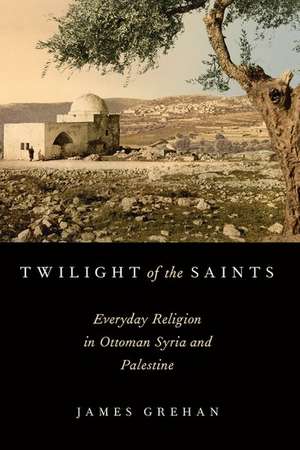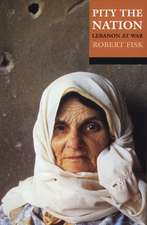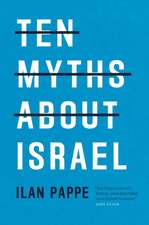Twilight of the Saints: Everyday Religion in Ottoman Syria and Palestine
Autor James Grehanen Limba Engleză Paperback – 4 aug 2016
| Toate formatele și edițiile | Preț | Express |
|---|---|---|
| Paperback (1) | 338.95 lei 31-37 zile | |
| Oxford University Press – 4 aug 2016 | 338.95 lei 31-37 zile | |
| Hardback (1) | 687.73 lei 31-37 zile | |
| Oxford University Press – 9 oct 2014 | 687.73 lei 31-37 zile |
Preț: 338.95 lei
Nou
Puncte Express: 508
Preț estimativ în valută:
64.86€ • 67.90$ • 53.67£
64.86€ • 67.90$ • 53.67£
Carte tipărită la comandă
Livrare economică 25-31 martie
Preluare comenzi: 021 569.72.76
Specificații
ISBN-13: 9780190619145
ISBN-10: 0190619147
Pagini: 360
Ilustrații: 23 illus.
Dimensiuni: 155 x 231 x 23 mm
Greutate: 0.52 kg
Editura: Oxford University Press
Colecția OUP USA
Locul publicării:New York, United States
ISBN-10: 0190619147
Pagini: 360
Ilustrații: 23 illus.
Dimensiuni: 155 x 231 x 23 mm
Greutate: 0.52 kg
Editura: Oxford University Press
Colecția OUP USA
Locul publicării:New York, United States
Recenzii
Deeply engaging and delightful.
Grehan provides new and important insights into religious faith and practice in Ottoman Syria and Palestine, but more broadly, his utilization of the concept of agrarian religion is a major contribution to understanding pre-modern religion. This book should be of help to anyone interested in the world history of religion.
Too often, the religious attitudes of pre-modern societies such as those of Syria and Palestine during the seventeenth through nineteenth centuries are interpreted through the prism of modern conceptions of religion. In a long-overdue intervention, Grehan demonstrates that these views warp our understanding of their history, and project our modern conflicts over religion onto the past in misleading ways. It will be an essential reader for decades to come.
Grehan's book is a pioneering study of folk religion in the Middle East on the eve of modernity. Looking for evidence 'on the ground' rather than in the texts of ulama or Islamic modernists, this richly documented historical ethnography of Syria and Palestine charts a world of saints and tombs, caves, and trees, genies and rites of blood which was shared by Muslims, Christians, and Jews of all walks of life.
Grehan provides an important corrective to earlier scholarly biases, such as describing folk customs in terms of their deviance from textual norms, and he recognizes that urban elites repeatedly joined in supposedly rural practices, whether venerating saints or appeasing ghosts. The author's careful appraisal of the evidence demonstrates that there is less of a gap between countryside and cityscape as much as there is a gulf between premodern and modern ways of enacting religion. A major benefit comes from how Grehan reads Muslim, Jewish, and Christian sources all together, emphasizing shared practices and common presumptions.
Grehan provides new and important insights into religious faith and practice in Ottoman Syria and Palestine, but more broadly, his utilization of the concept of agrarian religion is a major contribution to understanding pre-modern religion. This book should be of help to anyone interested in the world history of religion.
Too often, the religious attitudes of pre-modern societies such as those of Syria and Palestine during the seventeenth through nineteenth centuries are interpreted through the prism of modern conceptions of religion. In a long-overdue intervention, Grehan demonstrates that these views warp our understanding of their history, and project our modern conflicts over religion onto the past in misleading ways. It will be an essential reader for decades to come.
Grehan's book is a pioneering study of folk religion in the Middle East on the eve of modernity. Looking for evidence 'on the ground' rather than in the texts of ulama or Islamic modernists, this richly documented historical ethnography of Syria and Palestine charts a world of saints and tombs, caves, and trees, genies and rites of blood which was shared by Muslims, Christians, and Jews of all walks of life.
Grehan provides an important corrective to earlier scholarly biases, such as describing folk customs in terms of their deviance from textual norms, and he recognizes that urban elites repeatedly joined in supposedly rural practices, whether venerating saints or appeasing ghosts. The author's careful appraisal of the evidence demonstrates that there is less of a gap between countryside and cityscape as much as there is a gulf between premodern and modern ways of enacting religion. A major benefit comes from how Grehan reads Muslim, Jewish, and Christian sources all together, emphasizing shared practices and common presumptions.
Notă biografică
James Grehan is Associate Professor of history at Portland State University. He received his doctoral degree in history from the University of Texas at Austin. He currently lives in Portland with his wife and son.














